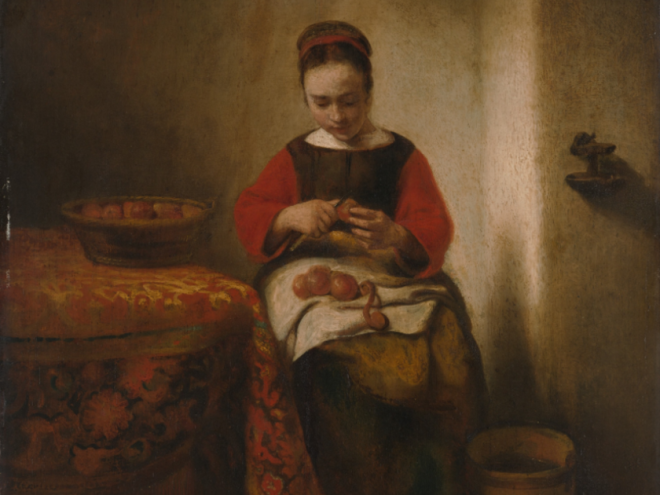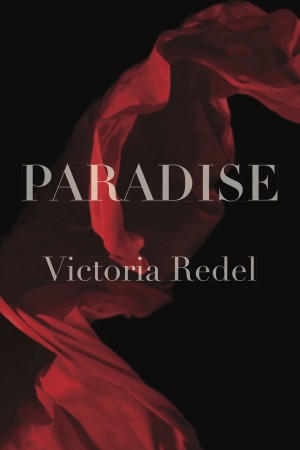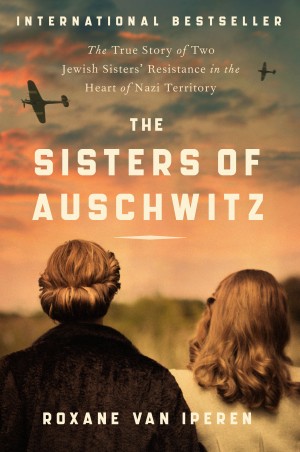In the foreword to her new novel, Victoria Redel notes that only a handful of facts are known about the personal life of Dutch Golden Age artist Maria van Oosterwijck (1630 – 1693). Among them: she never married, and she taught her servant Gerta Pieters how to paint. Onto this blank canvas, Redel has rendered an exquisite double portrait of van Oosterwijck and Pieters, who eventually became a professional painter in her own right.
I Am You begins when, at eight years old, Gerta is sent to be a servant in the van Ossterwijck family home. Mesmerized by fourteen-year-old Maria, who is already a budding artist, she is flattered when the older girl begins to use her as a model for her sketches. Soon, Gerta learns how to prepare pigment for Maria’s paints, and — once Maria strikes out on her own with Gerta as her personal maid — how to paint. She even begins to correct and improve Maria’s work.
Like recent novels such as Antonia Angress’s Sirens & Muses and Emma Copley Eisenberg’s Housemates, Redel’s I Am You explores the nuances of a romantic partnership between queer artists who are also one another’s muses. Because neither is limited to either role, their relationship entails a constant fluctuation of power. “Sometimes I was the servant in her bed and sometimes she was the mistress. Sometimes the contrary.” Publicly, Maria plays up their similarities, insisting that they wear near-identical outfits and allowing her patrons to guess whether a painting was created by her or Gerta. But, as Greta observes, this is a dangerous game. Maria feels threatened by Gerta’s talent, and Gerta chafes at being taken for granted. “At what point was I my own creation?” Gerta wonders. “At what point was I creating her?”
I Am You invites comparisons to Yael van der Wouden’s The Safekeep in that it illuminates not only overlooked queer history, but also the Netherlands’ vanished Jewish past. Golden Age Amsterdam, known as the “Jerusalem of the West,” was a refuge for Portuguese Jews fleeing the Inquisition. Despite the large Jewish presence in the city, Gerta only mentions Jews once, glancingly, in the first half of the novel. Then she and Maria take on a Jewish maid, Diamanta. As a newcomer to Maria’s household, and a servant from a different social class, Diamanta is also a mirror image of Gerta — although Gerta is far from eager to embrace this. Instead, determined to protect her status, she is “merciless” with her orders, asking Diamanta to follow her methods of cleaning and cooking even as she admits to the reader that Diamanta’s are just as good.
Then comes another power reversal. After an unexpected crisis, Gerta is taken in by Diamanta’s mother. Here, she tells us, “in Ximenes’s kitchen, I learned how little I understood of others’ lives.” Adapting to the laws of kashrut and Jewish rituals, she becomes a student again, stripping away her preconceptions and training her eyes to see the world from a fresh perspective. This cleansing process ends with her immersion in the mikveh. Gerta can no longer dismiss Jews as irrelevant; she even draws a parallel between her secret relationship with Maria and Diamanta’s family’s recent “hidden life” as Jews in Portugal.
Victoria Redel is a writer of poetry as well as fiction, and her vivid, lyrical prose reads like the literary equivalent to van Oosterwijck’s exacting still lifes. At the same time, I Am You gives us a panoramic view of the Netherlands at its most famous era — and it places Jewish and queer characters in the foreground.
Becca Kantor is the editorial director of Jewish Book Council and its annual print literary journal, Paper Brigade. She received a BA in English from the University of Pennsylvania and an MA in creative writing from the University of East Anglia. Becca was awarded a Fulbright fellowship to spend a year in Estonia writing and studying the country’s Jewish history. She lives in Brooklyn.




